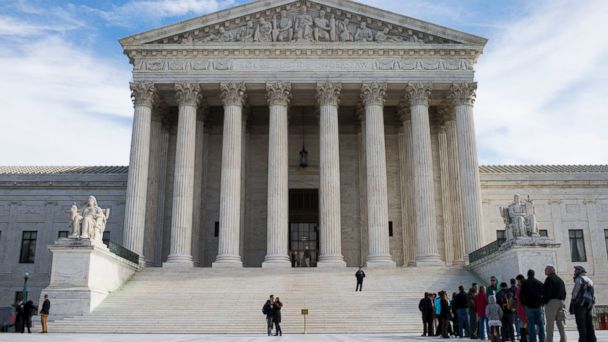Supreme Court Strikes Down Limits on Campaign Contributions

Credit: Bill Clark/CQ Roll Call/Getty Images
In a 5-4 decision, the Supreme Court today struck down aggregate contribution limits imposed on individuals wishing to donate to federal candidates and party committees.
"There is no right more basic in our democracy than the right to participate in electing our political leaders," Chief Justice John Roberts wrote in the opinion.
He added, "Money in politics may at times seem repugnant to some, but so too does much of what the First Amendment vigorously protects."
Roberts reiterated that today's decision deals with aggregate limits and not base limits on contributions from individuals to candidates
"This case does not involve any challenge to the base limits, which we have previously upheld as serving the permissible objective of combating corruption," he wrote.
READ: Winners and Losers
Currently, individuals may contribute $2,600 per election to a particular candidate committee and $32,400 to a national party committee. Those limits in a two-year cycle are $48,600 to a candidate committee and $74,600 to a non-candidate committee.
Roberts was joined in his opinion by Justices Antonin Scalia, Samuel Alito and Anthony Kennedy. Justice Clarence Thomas signed on to the holding but would have gone further by overruling court precedent.
Justice Stephen Breyer read a stinging dissent from the bench. He was joined by Justices Ginsburg, Sonia Sotomayor and Elena Kagan.
Breyer called legal analysis of the majority "faulty" - saying, "It understates the importance of protecting the political integrity of our governmental institutions. It creates a loophole that will allow a single individual to contribute millions of dollars to a political party or to a candidate's campaign."
Breyer also said the decision "eviscerates our Nation's campaign finance laws,leaving a remnant incapable of dealing with the grave problems of democratic legitimacy that those laws were intended to resolve."
The case was brought by Alabama businessman Shaun McCutcheon and the RNC who challenged the aggregate contribution limits. McCutcheon argued the limits violated his First Amendment rights and served no anti-corruption role.
Solicitor General Donald B. Verrilli Jr. defended the limits in court, saying they served as a "bulwark against a campaign finance system dominated by massive individual contributions in which the dangers of quid pro quo corruption would be obvious and inherent and the corrosive appearance of corruption would be overwhelming."
In the 2012 election cycle, McCutcheon contributed a total of $33,088 in congressional races across the nation. McCutcheon wanted to give money to more candidates and was blocked from doing so by aggregate campaign contribution limits set by federal law.
McCutcheon praised the decision in a statement.
"Today the United States Supreme Court took a stand in favor of our Constitutional Freedom of Speech as codified in our First Amendment," he said. "First Amendment Free Speech enables us to support candidates for public office who share our views. While I understand some base limits on the dollar amount of single contributions, limits to the overall number of candidates, parties and committees are nothing more than unnecessary limits to 1st amendment freedom."
But proponents of campaign finance reform condemned today's decision.
"The Supreme Court in the McCutcheon decision today overturned 40 years of national policy and 38 years of judicial precedent to strike down the overall limits on the total contributions from an individual to federal candidates and to party committees in an election cycle," said Fred Wertheimer, President of Democracy 21. "With its decision today in McCutcheon, the Supreme Court majority continued on its march to destroy the nation's campaign finance laws, which were enacted to prevent corruption and protect the integrity of our democracy."